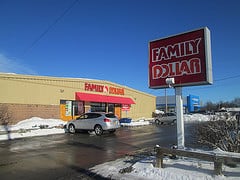Family Dollar (FDO: $69/share) is in the news after Carl Icahn disclosed a 9% position in the company after hours on June 6. Factoring in Trian Management and Paulson & Co.’s existing stakes, activist investors now own 23% of the company.
Icahn has not publicly announced his intentions for FDO, but it has been reported that he plans to push for a merger with Dollar General (DG) or some other partner. Others have suggested that Icahn may be interested in taking the company private. FDO has responded to that possibility by introducing a poison pill plan with a 10% ownership threshold.
Whatever course Icahn pursues, shakeups in management looks like a positive development for the company. FDO has struggled in recent years, and its return on invested capital (ROIC) has fallen from 15% in 2011 to 11% in 2013. More recently, same store sales dropped 4% in 2Q14 and FDO announced it would be closing 370 stores.
FDO’s financial performance compares poorly to the results of a competitor such as Dollar Tree (DLTR), which has maintained a steady 15% ROIC for the past three years. DLTR also increased same store sales by 2% in the most recent quarter. DG has a lower ROIC than FDO but has managed to maintain same store sales growth.
The question is not whether a shakeup is needed at FDO, but whether Icahn will be able to make a positive impact. The most likely plan seems to be a merger with DG, but there are several issues that could derail this plan. Most notably:
- It might not make sense for DG. The most DG could pay for FDO and still earn an ROIC above its weighted average cost of capital (WACC) is $10.3 billion. I base this number off of FDO’s $550 million after-tax profit (NOPAT) and DG’s WACC of 5.3%. After the post-Icahn announcement surge, FDO has an enterprise value of ~$11.2 billion. Unless DG expects significant synergies, a merger does not make economic sense at current valuations.
- It doesn’t address core issues. One of the biggest problems for FDO recently has been the increasing percentage of its sales made up by low-margin consumables, while higher margin categories suffer. Consumables have increased from 67% of sales to 72% of sales in the past two years. Unfortunately, this problem is even worse at DG, where consumables now make up 75% of sales. Both companies have seen gross margins decline by roughly one percentage point over the past few years.
- Scale only helps so much. The biggest competitor for both FDO and DG is Walmart (WMT). A combined FDO and DG would have $28 billion in annual revenue compared to $475 billion for WMT. A merger might produce some economies of scale, but it wouldn’t put them at any less of a disadvantage to the retail giant.
Taking the company private involves some of the same issues. FDO was reasonably cheap at ~$60/share before Icahn disclosed his stake, but management’s hostility to an activist buyout, as evidenced by the poison pill plan, means a significant premium would likely be required.
More importantly, taking FDO private doesn’t inherently solve any of its problems. The experiences of Bill Ackman at JC Penney (JCP) and Eddie Lampert at Sears (SHLD) show that a good activist investor is not always so good at running a retail business.
Icahn bought into FDO because he believes that the stock is cheap due to poor management. On that point I agree with him. However, I’m less convinced that he will be able to fix the company’s woes. Icahn might be able to engineer a sale to DG or someone else that will earn himself and other shareholders a quick profit, but unlocking long-term value will be a much more difficult task.
Sam McBride contributed to this report.
Disclosure: David Trainer and Sam McBride receive no compensation to write about any specific stock, sector, or theme.
Feature Photo Credit: Random Retail (Flickr)
